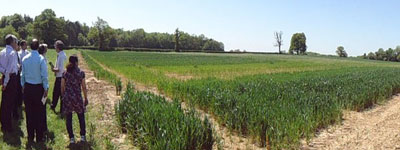In the company of some of the India’s top crop scientists, I got an opportunity to interact with their counterparts as well as visit the UK’s best agricultural/plant research institutes last month.
More than half of this week-long visit was taken up by a bilateral workshop on crop genomics, jointly organised by the two funding agencies, the Biotechnology and Biological Sciences Research Council (BBSRC, UK) and the Department of Biotechnology (DBT, India). The workshop was held in the beautiful surroundings of Norwich in BBSRC’s world class institutes, The Genome Analysis Centre (TGAC) and the John Innes Centre (JIC). A tour of JIC in the biting cold, followed by visit to TGAC in warm sunshine (vagaries of English weather!), provided just the right setting for stimulating interactions between the attendees. The workshop led to a clear consensus among participants on potential areas based on which a joint call for proposals could be launched. Watch this space!
Rothamsted Research, world’s longest running agricultural research station, was our final site visit. Rothamsted has rich links with Indian researchers, with India being the second largest participant of the Rothamsted International Fellowship Scheme. Talks ranged from Rothamsted’s activities on modelling impacts of climate on wheat yields, a new 20:20 wheat initiative to designing of seeds. It was clear to me that sustainability was the common thread among all these research areas.
A farm tour of Broadbalk and large scale wheat experiments completed our visit on a high note. The Broadbalk Experiment initiated in 1843 is the premier long term fertility and cropping systems experiment in the world.
Besides these visits, we were able to enjoy the amazing English countryside during our travel. We were privileged to learn more about the interesting flora not only in UK but rest of the world in the Royal Botanic Gardens, Kew on our way to the airport. Kew houses some of the largest and most diverse botanical collections, including reference collections. Visit to the herbarium and Jodrell Laboratory, including world’s largest fungi collection, made me nostalgic for my graduation days when I was studying botany. ‘The visit to Kew was the icing on the cake’, as stated by an Indian delegate, succinctly captures our brief stopover in Kew.
It was certainly a happy bunch that walked into Heathrow departure lounge at the end of this whirlwind tour. Not only has it laid down firm grounds for research partnerships in this significant area but also exposed us to the excellent crop research base existing in UK.

